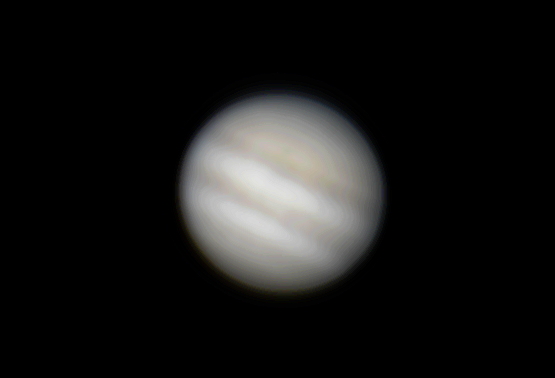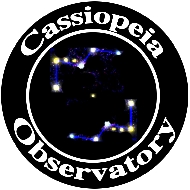iPhone Fisheye Lens NightCap Camera ISS;
DSLR Jupiter
Posted: 15 June 2017
|
Open: Wednesday, 14 June 2017, 1900 MST Temperature: 99°F |
Session: 1123 Conditions: Mostly clear |
Equipment Used:
12" f/8 LX600 w/StarLock
2" 24mm UWA eyepiece
1.25" 15mm eyepiece
1.25" 9mm eyepiece
SkyTracker Pro
Camera:
iPhone 6s Plus
D7200 DSLR
Upon arrival at the observatory I set up the SkyTracker Pro with an iPhone 6s Plus + Fisheye Lens using the Levenhuk Smartphone Adapter to photograph a high pass of the International Space Station (ISS):

1930 MST: returned to the observatory. LX600 ON, StarLock OFF, High Precision OFF.
Clouds were increasing. Viewed Jupiter, 102X. Four moons visible.
1936 MST: sunset. This is a sky photo taken the iPhone 6s Plus + Fisheye Lens using NightCap Camera showing some of the clouds:

Next, I prepared the D7200 DSLR for later imaging of the planet Jupiter, clouds permitting.
Then viewed Jupiter, 163X.
1948 MST: thin clouds were now in most of the sky. Terminated the first Kissing Bug of the night.
I began getting ready for the ISS pass. Due to clouds and sky brightness I could not accurately polar align the SkyTracker Pro. But as I would be using the Fisheye Lens and 1/2X Sidereal Tracking Rate I figured that would not be a major problem.
Once the ISS became visible in the northwestern sky I started "ISS" mode on the iOS app NightCap Camera for this nearly 4 minute exposure:

Mouseover or tap on image for labels
2015 MST: returned to the observatory. Viewed Jupiter, 163X. Then began setting up for eyepiece projection 271X imaging of Jupiter using the D7200 DSLR. The planet was visible through some thin clouds.
Both of these images were taken using HD video recordings, 1/125sec, ISO 3200, White Balance Auto. The top image is a stack of 318 video frames (10 seconds); the bottom image is a stack of 636 video frames (10 seconds) using a crop factor of 1.3X on the DLSR.


2030 MST: ended imaging due to clouds. Terminated Kissing Bug #2.
2035 MST: LX600 OFF.
2041 MST: Kissing Bug #3 terminated. And as I was closing up the observatory I terminated two more Kissing Bugs.
|
Close: Wednesday, 14 June 2017, 2052 MST Temperature: 79°F |
Session Length: 1h 52m Conditions: Cloudy |
Comments are welcome using Email. Twitter users can use the button below to tweet this report to your followers. Thanks.
Cassiopeia Observatory Home Page
Copyright ©2017 Michael L. Weasner / mweasner@me.com
URL = http://www.weasner.com/co/Reports/2017/06/15/index.html
